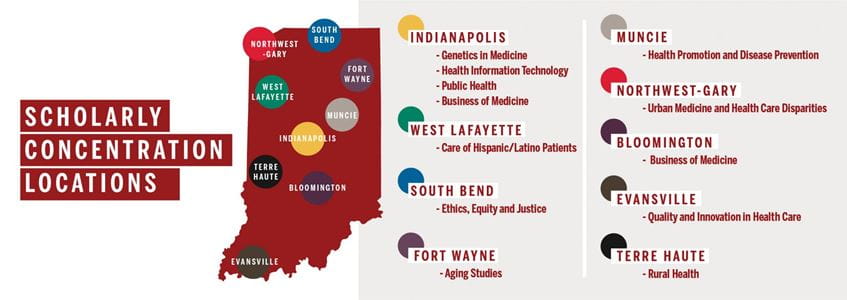Dear Colleagues,
One of our obligations as a medical school—and a priority of our strategic plan—is to maximize the success of our learners. Certainly, that means preparing medical students for step exams, exposing them to diverse clinical experiences and ensuring they are poised to excel in residency. But it also means helping students find joy in the practice of medicine, and equipping them with skills they need to make medicine better throughout their careers.
With that in mind, I am excited to use my column this month to announce the establishment of our new Scholarly Concentrations program and to explain a little about how it will help achieve those aims.
Explore Scholarly Concentrations and Available Topics
ABOUT SCHOLARLY CONCENTRATIONS
Spearheaded by Executive Associate Dean Paul Wallach, the Scholarly Concentrations program is designed to allow students to pursue an area of interest or passion that goes beyond the standard medical school curriculum. The opportunities being offered draw upon the expertise of faculty on our campuses throughout the state and include important topics such as Ethics, Equity and Justice; Care of Hispanic/Latino Patients; and Health Information Technology, to name a few.
With faculty guidance, participating students will complete didactic and project-based work related to their chosen topic. Notably, concentrations are intended to be completed within the four years of medical school by taking advantage of summers, electives, and less intense times in the curriculum. In other words, they are manageable.
So why do we believe our students will benefit from these offerings, particularly when the content will likely never make its way onto Step 1? Certainly, completion of a Scholarly Concentration will add some gravitas to their CVs and make students more competitive when applying for residencies. But that is just the beginning.
SUPPORTING WELLNESS
We all know that burnout is a problem among physicians, and we must therefore create a culture that promotes wellness among our students and graduates. Tait Shanafelt, a nationally recognized leader in physician wellness from Stanford, found that physicians who spend at least 20 percent of their time on an aspect of their work that is most meaningful to them were less likely to experience burnout. In short, having a part of your job you are passionate about improves wellness.
In my own career, beyond diagnostic pathology I have found great satisfaction in teaching and in laboratory and translational research. I recognize that each person will have their own passions. The Scholarly Concentrations program is designed to help students develop interests that will inspire them now and that they can continue to cultivate throughout their careers. We expect the program, in turn, will make participants happier and more resilient as students and as practicing physicians. In doing so, Scholarly Concentrations will complement the other important work we are doing to promote wellness and mental health.
NOURISHING FACULTY/STUDENT RELATIONSHIPS
The program will also provide opportunities for students to work closely with highly regarded faculty members and with other students who share their interests across the state. These faculty mentors and colleagues will be another source of support and encouragement when navigating medical school. Our hope is that these relationships will continue long after students graduate.
From a faculty perspective, the program enables our educators to share expertise that is not part of the standard curriculum and allows for creativity in teaching—as well as providing more help in carrying out projects.
TACKLING CHALLENGES IN MEDICINE
Finally, we want our graduates to view making health care better as a part of their mission. Scholarly Concentrations will prepare them to do so, whether they work at an academic medical center or in private practice.
Take, for example, the Quality and Innovation in Health Care concentration being offered by our Evansville campus. Participating students will earn Lean Six Sigma Green Belt certification and might work with faculty on projects related to readmission rates for hip and knee replacements or 30-day mortality rates following a stroke.
The Health Promotion and Disease Prevention concentration in Muncie will enable students to take on issues such as telemedicine and access to primary care. And those admitted to the Urban Medicine and Health Care Disparities concentration may conduct projects related to racial gaps in infant mortality and the value of community health workers.
As you can see, Scholarly Concentrations are more than academic exercises. They will equip our students with the experiences and skills necessary to be leaders in health care innovation and delivery, regardless of where they practice.
A WORTHWHILE INVESTMENT
We feel confident that empowering students to explore their diverse talents and interests through Scholarly Concentrations will put them in a position to make medicine better, and it will set them on a path to be healthier and happier in their careers—now and in the future.
I encourage each of you to take some time to visit the Scholarly Concentrations web page and to explore the concentrations that will be available to students beginning this summer. And for students, I hope you will think about which of these areas of study spark your interest and apply to be among the first participants.
Sincerely,

Jay L. Hess, MD, PhD, MHSA
Executive Vice President for University Clinical Affairs
Dean of the School of Medicine
Indiana University
